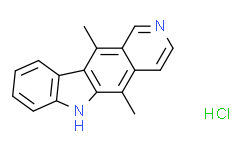| DC5184 |
Epirubicin HCl (4'-epidoxorubicin)
|
Epirubicin HCl, a semisynthetic L-arabino derivative of doxorubicin, is an antineoplastic agent by inhibiting Topoisomerase. |
| DC7530 |
Voreloxin
|
Voreloxin(SNS-595; AG 7352) is a small molecule and a naphthyridine analogue with antineoplastic activity; inhibitor of Topo II. |
| DC8536 |
TAS-103 2HCl
|
TAS-103 2Hcl(BMS-247615 2Hcl) is a dual inhibitor of topoisomerase-I (topo-I) and topoisomerase-II (topoII). |
| DC8852 |
SW-044248
|
SW-044248 is a Novel Inhibitor of Topoisomerase I Is Selectively Toxic for a Subset of Non-Small Cell Lung Cancer Cell Lines. |
| DC5905 |
SN-38(NK-012)
|
SN-38(NK-012) is an active metabolite of CPT-11, inhibits DNA topoisomerase I, DNA synthesis and causes frequent DNA single-strand breaks. |
| DC8934 |
Irinotecan
|
Irinotecan(CPT-11) prevents DNA from unwinding by inhibition of topoisomerase 1. |
| DC8111 |
Idarubicin Hydrochloride
|
Idarubicin Hcl is an anthracycline antibiotic and a DNA topoisomerase II (topo II) inhibitor. |
| DC8325 |
Ellipticine
|
Ellipticine is a DNA intercalating agent and a DNA topoisomerase II inhibitor. |
| DC10410 |
Ellipticine hydrochloride
|
Ellipticine hydrochloride is a potent antineoplastic agent; inhibits DNA topoisomerase II activities. |
| DC4188 |
Doxorubicin hydrochloride
|
Doxorubicin (Adriamycin) is an antibiotic agent that inhibits DNA topoisomerase II and induces DNA damage and apoptosis. |






















